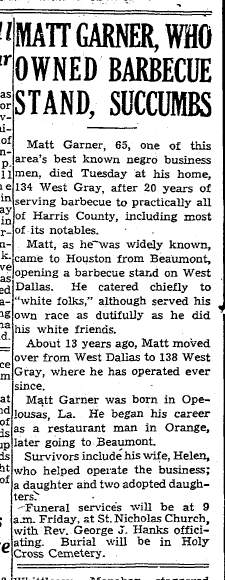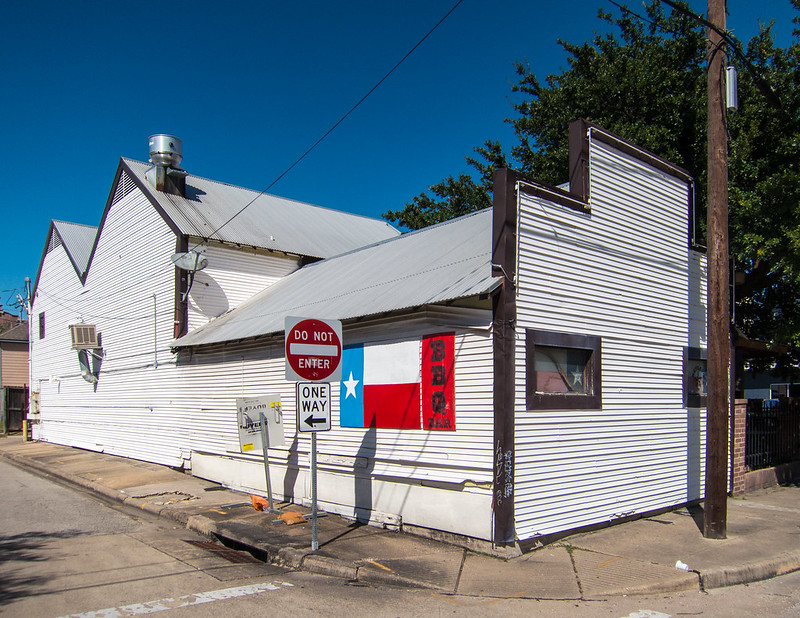Barbecue Baron Matt Garner
It was a curious mention in the Oct. 22, 1938, edition of the Pittsburgh Courier, a newspaper covering African-American news in Pennsylvania and around the U.S.
“Matt Garner, famous barbecue baron of Houston, Texas, was a visitor in the Crescent City,” read the item in a roundup of news from around the country.
Who was Matt Garner, and how did he become a “barbecue baron” in Houston in 1938?
In my research into Houston barbecue history, Matt Garner’s name pops up often, although most of what I can find about him is either administrative, in the form of official documents, or anecdotal, in the form of long-ago memories of those who patronized a restaurant. There is virtually no personal documentation about the man.
It’s frustrating because by all accounts, he just might be the founding father of contemporary Houston barbecue with its strong Cajun and African-American influences. By piecing together bits of information from different sources, we get a better understanding of who Garner was: husband, father, pitmaster, entrepreneur and, indeed, barbecue baron.
He is credited with bringing the design of rectangular brick barbecue pits to Houston, along with the recipe for the all-beef “Beaumont-style” beef links that are still served in many barbecue restaurants here.

The story, as we know it now, is simple because the information comes from U.S. Census lists and old city directories. Charles Matthew Garner was born in Opelousas, La., between 1870 and 1880 (documents differ). By 1920, he had married Helen Constance Garner, also from Opelousas, and the couple lived on Isla Street in Beaumont with their daughter, Beulah, and cousin, Ambus Paya.
Garner, who was listed as “mulatto,” also was named as the owner of a restaurant and Ambus Paya, all of 12 years old, was a waiter.
By 1927, though, the family had made it to Houston, as the city directory listed the family at 830 Arthur and as operating a barbecue stand at 820 W. Dallas. Indeed, both West Gray and West Dallas streets were known for barbecue stands from the 1920s to the 1950s.
In 1934, Garner moved the barbecue stand to 138 W. Gray where it would operate through the early 1980s.
There is an anecdotal story of how Garner acquired the West Gray property. In her autobiography, Houstonian Ann Bandy claims that her father, Clay G. Wunsch, deeded the property to Garner. Bandy relates that her father ran the commissary, or cafeteria, for the Southern Pacific railroad and that Garner cooked barbecue for him. Wunsch was so impressed by Garner’s smoked meat that he bought the property on West Gray for Garner to open a restaurant.
By 1938, Matt Garner’s Bar-B-Q Drive-in had become successful to the point where Garner was being referred to as a “barbecue baron.”
Garner expanded east to Orange in the early 1940s. Advertisements in The Orange Leader newspaper from June 1941 to March 1942 included notices for “Matt Garner Barbecue House – All Kinds Barbecue – Tables for Ladies.”
Garner died of a heart attack on Aug. 14, 1945, at the age of 64 and was buried in the Holy Cross Cemetery in Houston.
From that point, Helen Garner was listed as owner of Matt Garner’s Bar-B-Q, which flourished through the 1950s and ’60s.
Helen Garner was 84 when she died on Aug. 14, 1965, 20 years to the day after her husband died. Daughter Beulah and son-in-law Leroy Mouton then took over the restaurant.
There are few references to the barbecue joint after that. The 1972 barbecue issue of Texas Monthly magazine lists Matt Garner’s as one of the best in Houston. In the October 1980 issue of Houston City magazine, Alison Cook (now the Houston Chronicle’s restaurant critic) mentioned Matt Garner’s “distinguished brisket” and noted that she couldn’t get the recipe for the “blessedly unsugary barbecue sauce” out of the owner – “Leroy Mouton (is) just not telling.”
Beulah Mouton died in 1981, and the restaurant closed not long after that. It reopened briefly in the mid-1980s – it appears that family friends wanted to resurrect it – but that iteration didn’t last long.
 Old Matt Garner location on W. Dallas (since burned down)
Old Matt Garner location on W. Dallas (since burned down)
If you read old interviews with pitmasters who established the city’s contemporary barbecue scene – Harry Green, Joe Burney, John Davis, Oscar Lott – they inevitably mentioned the influence of Matt Garner.
Through today’s pitmasters, using the equipment and technique he pioneered, the legacy of Houston’s own “barbecue baron” lives on.

